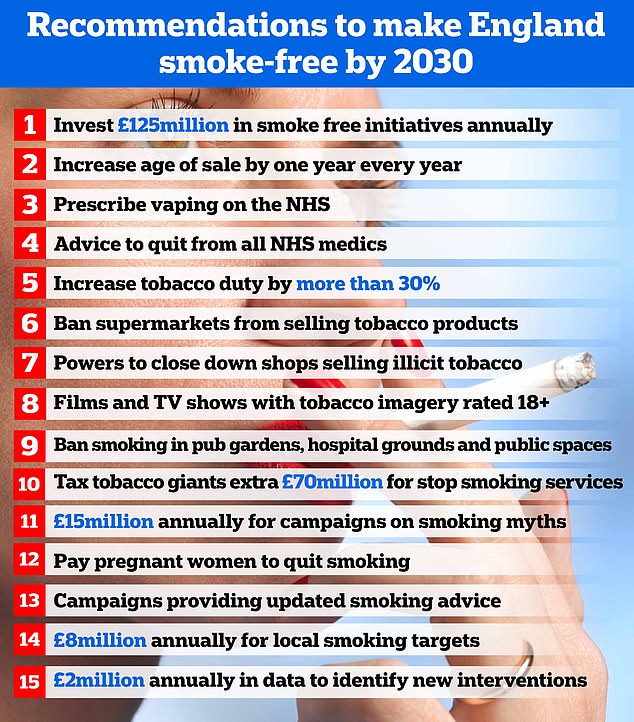Has WFH derailed UK’s smoke-free goal? Rates stagnated in pandemic as experts suggest knock-on effects of hybrid working triggered worrying slowdown
Working from home during the pandemic may have deterred people from quitting smoking, researchers suggest.
The rate of decline in smoking rates across England appears to have 'stagnated', with more young people taking up smoking during the pandemic and a slower decline in the number of middle class quitters than those who were less affluent.
Experts led by University College London (UCL) analyzed data from 2020 to 2022 to see what impact the Covid pandemic had on smoking rates.
The study found that before the pandemic, smoking prevalence fell by 5.2 percent per year, but during the pandemic this rate slowed to 0.3 percent per year.
Researchers suggested that people who are less affluent may have felt more urgency to quit during the pandemic, while those who were wealthier and in professional or managerial positions may have continued to smoke due to stress.
Tobacco use in Britain earns taxpayers £10 billion but costs society an estimated £17 billion. The number of smokers has fallen to just 12.9 percent in recent years, while obesity has risen to 65.5 percent. Government estimates put the cost of obesity at £27 billion a year, while other estimates put the figure much higher

Last year, a Department of Health spokesperson said tackling smoking problems was a “priority” for the office. Here is a list of actions recommended in a landmark government-backed report
They said: 'Possible explanations for these differences include that people from less privileged social classes are more likely to experience the financial consequences of the pandemic (for example due to job loss or lower incomes), thus preventing (initiating or continuing) smoking becomes less affordable, or working in frontline jobs that increase exposure to Covid-19 and may make smoking cessation a higher priority.
'In addition, manual jobs were less disrupted by the pandemic, while many non-manual jobs shifted to working from home, leading to loneliness and poorer mental health, potentially making people in more privileged social classes less likely to try to quit smoking. '
The team said younger adults have also experienced higher levels of stress, anxiety and social isolation during the pandemic “which may have contributed to the increased prevalence of smoking in this group.”
The study warned that the government must 'reinvigorate progress in reducing smoking among the more advantaged social classes and find ways to accelerate the decline among less advantaged groups' if it is to achieve its target of making England smoke-free by 2030 to make.
Lead author Dr Sarah Jackson, from UCL, said: 'The prevalence of smoking among adults in England has been steadily declining for more than two decades.
'Our data shows that this decline has stalled, with an increase in smoking cessation rates possibly offset by an increase in the number of people taking up smoking or an increase in late relapses.
'These findings make bold policy action more urgent. The government was not yet on track to meet its target of making England smoke-free by 2030.
'This research shows that we are even further off track than we thought.'
The study, funded by Cancer Research UK and published in the journal BMC Medicine, examined survey data from 101,960 adults between June 2017 and August 2022.
The researchers estimated the proportion of smokers in England at 16.2 percent in June 2017, falling to 15.1 percent at the start of the pandemic and remaining unchanged as of August 2022.
Other UK data published by the Office for National Statistics (ONS) in September showed that almost 13 percent of all adults smoked in 2022.
Senior author of the new research, Professor Jamie Brown, from UCL, said: 'The government's proposal to criminalize selling tobacco products to anyone born after 2008 could bring us much closer to a smoke-free 2030.
“Other bold actions that have been proposed, such as increasing investment in mass media campaigns and distributing a million e-cigarettes to smokers, could also make a significant difference.”
Dr. Ian Walker, executive director of policy at Cancer Research UK, said: 'These findings show why we cannot be complacent when it comes to tobacco. It can be easy to start smoking, but notoriously difficult to quit.'
